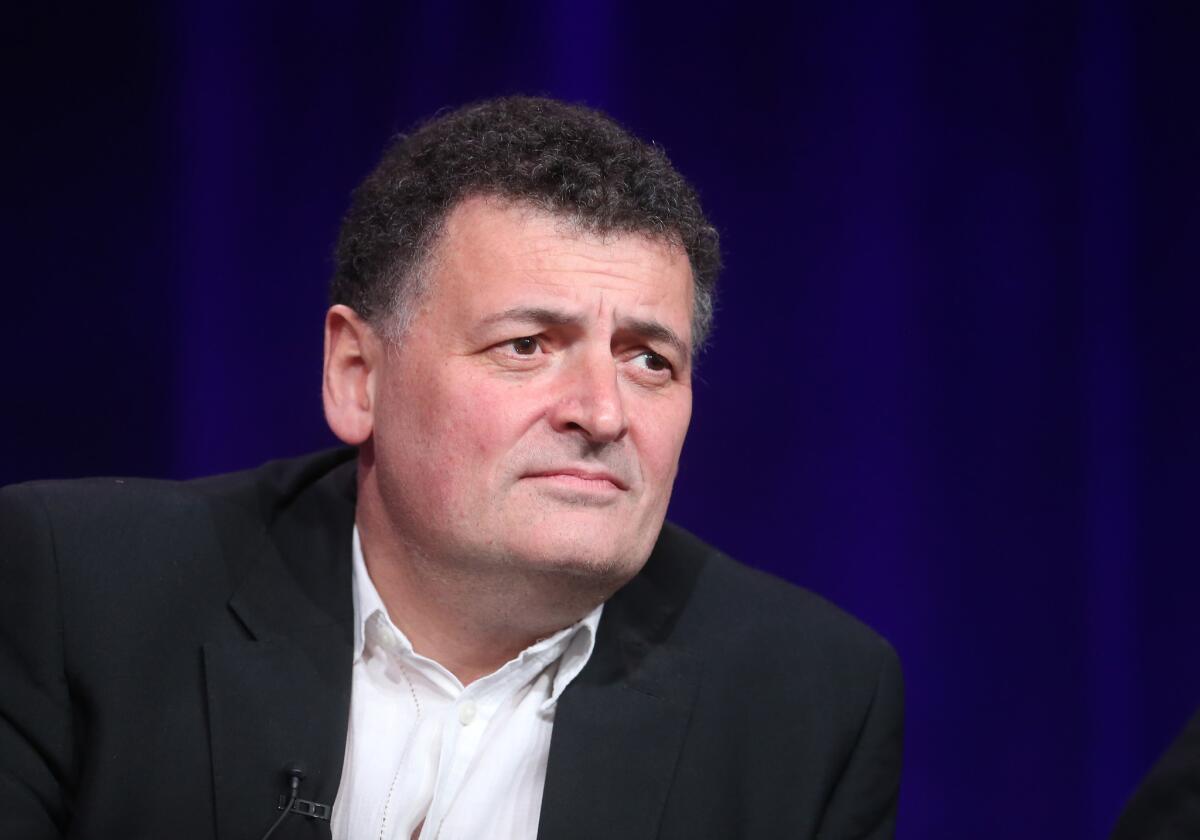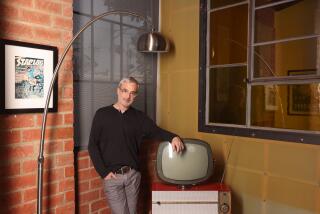Q&A: Steven Moffat on ‘Doctor Who’: Space, time and Christmastime

Head writer Steven Moffat has been determining the course of “Doctor Who” since 2010, when show runner Russell Davies handed him the keys to the TARDIS and Matt Smith became the 11th Doctor, a dark and madcap traveler in time and space.
He has written five Christmas episodes for the Doctor, four for Smith and the latest, “Last Christmas,” which airs Christmas Day on BBC America, for Peter Capaldi, the current inhabitant of the role. (The Doctor regenerates, you see.) Earlier stories have made reference to Dickens (“A Christmas Carol,” 2010) and C.S. Lewis (“The Doctor, the Widow and the Wardrobe,” 2011); the new one includes Santa Claus and is set at the North Pole. Moffat has described it both as “Miracle on 34th Street” meets “Alien” and “Miracle on 34th Street” meets “The Thing.”
Last known companion Clara (Jenna Coleman) is again aboard. Nick Frost (“Shaun of the Dead,” “Hot Fuzz”) plays Santa. As is traditional, there is snow.
I spoke with Moffat, transatlantically, about “Doctor Who” at Christmas and other times.
What are your own childhood memories of Christmas Day television?
Steven Moffat: Well, there was never a “Doctor Who” special then. It would all be around the [beloved British comedians] “Morecambe and Wise Christmas” special, which was huge back then. Massive. It’s a big day here. That doesn’t mean everybody watches it, but the channels do compete viciously with each other on that day, and on you will have the big shows -- “Call the Midwife,” “Doctor Who,” “Downton Abbey,” “EastEnders” -- everything is on that day. As a piece of scheduling, it’s quite extraordinary. So it’s a proper battleground between the networks Christmas Day over here.
Do you approach writing the Christmas specials with any special excitement?
I dearly love a Christmas special, whether it’s “Doctor Who” or not. The reality is I always approach “Doctor Who” with excitement -- otherwise, I wouldn’t still be doing it. It’s something I still really seriously enjoy. I suppose there are extra challenges; I’m aware of the fact that a lot of folk are watching that don’t normally watch it, what are we going to do to make it Christmas-y, all that stuff. But it’s always exciting to do “Doctor Who.” Otherwise, you’d never put up with it, because it’s hard work.
Generally speaking -- this isn’t always the case, but mostly it’s the case -- the Christmas special tends to be less involved with the whole overarching thing than the other episodes. I suppose over time we’ve made it more involved; actually, this year it’s got bits that are quite sequel to the last year of the show. But in the end, the audience just wants to sit down and actually watch “Doctor Who” -- they don’t want you just to turn it into a Christmas spectacular. So it’s not massively different; we just have this big word in front of you that says it’s Christmas Day -- it has to be Christmas Day. And you have to keep in mind that some people are being forced to watch it that don’t normally watch it, cause it’s a big family event.
And you know what’s like about 6 o’clock on Christmas Day -- you can hardly keep your eyes open, you’ve been stuffing your face, you’ve been drinking champagne since 10 in the morning. It’s the most highly sugared day of the year, so maybe it’s not the time for the most intricately plotted piece of “Doctor Who” you’ve ever done. It’s time to make it quite accessible and quite appropriate to the day. And it’s got to have a big heart, and it’s got to be a bit sentimental. But then, “Doctor Who” always has those things, so maybe it’s not that different.
Yet some important things have happened in Christmas specials -- both David Tennant’s first full episode as the 10th Doctor (“The Christmas Invasion,” 2005) and Matt Smith’s last as the 11th (“The Time of the Doctor,” 2013) fell on Christmas.
Those are just things that come up in the cycle of the show; it’s not something we do on purpose. For logistical reasons, it was the right time for Matt to leave and the right time for David to leave. I’m not that in favor of killing off a children’s hero on Christmas Day.
What made you think of using Santa Claus?
I don’t remember, in all honesty. It just came up as a fun idea. In Britain, the Doctor and Santa Claus are the two big heroes at Christmas, so for them to share an adventure, just the visual of Father Christmas entering the TARDIS, is kind of cool. I always loved Santa when I was kid, and I think it’s a great idea for kids to see the Doctor and Santa riding a sleigh together. That’s exciting.
How did you decide on Nick Frost to play him?
That was just when our very brilliant casting director Andy Pryor got the list together of who it could be. But when you think of Nick Frost, and he’s sort of funky and interesting and cool and, heaven knows, he practically is called Santa Claus -- Nicholas Frost, how much closer could it to be? He’s what Santa should be in the “Doctor Who” universe; he’s perfect for us, and the kids love him. It just seemed natural -- had own beard, is right shape.
Was it different writing a Christmas episode for Peter Capaldi? His Doctor is a bit grumpier than Matt Smith’s was.
Matt’s could be quite grumpy at Christmas, too. We had a whole episode where he refused to have anything to do with it, in “The Snowmen.” On paper, the Doctor never changes that much -- it’s the different performance. Matt Smiths’ Doctor was mostly cheery with a grumpy man underneath, and Capaldi’s is more like a grumpy man with a cheery man underneath; but, oddly, the experience of writing a doctor doesn’t change that radically. He’s the same man; he’s just got a different face and a slightly different mood.
So you’re writing the same character.
Very much so. Very much the same character. And that’s the thing -- if you fail to sell that; if people don’t think it’s the same character, the show goes off the air. It’s a different version, he’s changed a lot; but you don’t want to think that Matt Smiths’ Doctor just died, you want to think that he’s reborn as somebody else. And you know, you’ve been reborn, too: You’re not the same as you were when you were a teenager or a toddler. You’re not the same at work as you are at home. We all change. So it’s not foreign that he superficially is different. When it comes right down to it, of course, he’s exactly the same; at his heart he’s the same man.
Do you feel a continuity with all the earlier, classic-era Doctors?
Yeah, totally. Absolutely. In no sense is the new series -- I say new, it’s nearly 10 years old now -- a reboot. It’s not starting again. It’s the same show that took some time off, that’s all, so we’re absolutely clear about that. When we did “The Day of the Doctor,” we had all the old Doctors flying in in the TARDIS. We’ve had [fifth Doctor] Peter Davison meet [10th Doctor] David Tennant. We had had [fourth Doctor] Tom Baker turn up for the 50th anniversary; it’s the same show.
I love that you brought [eighth Doctor] Paul McGann back for that pre-anniversary miniepisode.
Oh, yes, “The Night of the Doctor.” Yes, he was great. That’s all making sure that you loop in the continuity to include the American television movie.
Does canonicity matter to you?
Well, yes, provided you’re prepared to embrace that some of these adventures happen twice and there are massive contradictions. But why shouldn’t there be? As I once said, you can’t really have continuity errors in a show that embraces the idea of changing history and parallel histories; you can enjoy all of “Doctor Who” if you want. And I kind of think you should. I think everything’s canonical. You know, why not? Why not just say it all happened. Some of it happened twice. Sometimes he was human, sometimes he was a Time Lord. Who cares? You’re allowed. Everything is equally fictional; it’s a kind of nonsense to say otherwise.
The nice thing about “Doctor Who” is that you’ve got time travel as a given; it’s not a given in anything else -- even “Star Trek” has to make an effort to do time travel. And I’ve always liked time travel stories. It’s our main character’s basic superpower, isn’t it, that he can travel in time. Other [“Doctor Who”] writers have ignored the time travel aspect altogether and been every successful doing that; it’s just a question of taste.
Does it matter whether the timelines are “mathematically” correct, that they line up logically, or just that they’re poetically right?
All the rules of that kind of thing on “Doctor Who” are dramatic and, as you say, poetic rather than scientific or mathematical, because that’s the kind of show it is. You sort of set up the world with every episode, and you stick to the rules of that episode; sometimes you break them elsewhere. But that’s not how people watch “Doctor Who.” In modern “Doctor Who,” the British prime minister shot dead the American president on television -- and no one ever referred to it again. I think if it actually happened, that would be mentioned quite a lot. It would cause a moment of unease between the nations.
Robert Lloyd tweets from a corner of space-time @LATimesTVLloyd
More to Read
The complete guide to home viewing
Get Screen Gab for everything about the TV shows and streaming movies everyone’s talking about.
You may occasionally receive promotional content from the Los Angeles Times.







